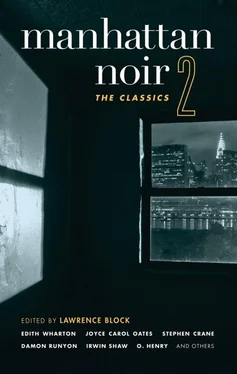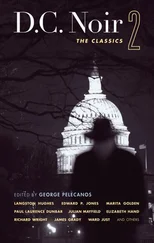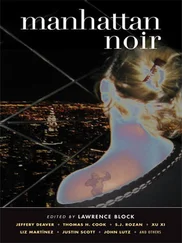So, he had killed her. After saying what she did, his wife must have turned to leave the office, but before she could even reach the door the doctor had, in a fit of passion, ended her life. With a scalpel or hypodermic injection or whatever else doctors kept in their examining rooms.
They weren’t regulated, that was the trouble. An M.D. could get away with anything, once you had that degree on the wall. But it did not guarantee that you could have sex with your patients.
That was the point at which he had gone wrong. It would have been a clean wound — he knew his business, after all — with very little bleeding and after that with crazed skill the doctor would have disposed of the weapon and erased all signs of his own implication in the crime.
Had she died immediately? Or had she hung on, gasping on the floor for a few moments, her eyes slowly gazing as she stared at the fluorescence? Well, no need to be too graphic, he will think of that some other time. He wants to think that it was a clean, quick death; even for her cruelty she should not have suffered.
The securities then. With the woman lying at last dead before him the doctor’s passion would have turned to panic and then at last to mad cunning as the thought came to him that without witnesses and with the fact of a sterile marriage there would be an available suspect.
If he could plant the securities near the body then the investigation would inevitably turn away from him, despite the fact that it was his office, and toward the husband with whose fate those securities were inextricably linked.
The doctor would not even have to worry about getting the corpse from the office; it would be credible that the husband would want to kill her in surroundings where someone else would be implicated.
Double reverse. Sitting in the hotel room he nods slowly, being able to appreciate, as he thinks the thing through, the doctor’s cunning all the way down the line.
So the doctor had done it then. There was plenty of information from the wife over seven years and he knew exactly where to look. He had seized the securities, placed them on top of the corpse and then closed up his office, knowing that all of this would shortly be found by the authorities who would make the connections.
The trap had sprung well. If he had not finally had the alertness and good sense to consider the issue of the doctor, the man without whom, damningly, the crime could not have worked, he would never have gotten out. But finally, through his own thought and effort, the crime has been solved.
If he can get the facts to the right people in time.
Robinson first. He must call Robinson and give him the explanation slowly, carefully, just the way he has worked it out.
His business partner is a ponderous man; he must take time to explain and not confuse him by hurrying. Still, he knows that he can be counted on: if it were not for Robinson smuggling him away from home at the critical moment and into this dismal but safe hotel room he would at this moment be in a cell, awaiting trial and conviction.
Still, he thinks, Robinson could have shown better taste in hotels; even at this level there must be a better place and the drug traffic is incessant.
But his partner and friend of almost a quarter-century, the only man he could ever trust, had stood by him as none of the others would, not even the inspector. Robinson insisted steadfastly that he was innocent, that he never could have done it. And had bought just enough time from the inspector to put him, for the moment, out of their grasp.
But only for the moment. He must remember that. Like his poor wife, he had run out of time.
He will tell Robinson and his partner will go to the inspector on his behalf with the story. Once the police know which trail to investigate, the crime will open up before them just as for himself it has opened in this grim hotel room.
The doctor’s hasty disappearance, his failure to contact the answering service, the peculiar aspect of the corpse, the way in which the office was left — all of these will assume a different cast in the inspector’s mind. He is too tough and shrewd to deny the obvious once it is presented on him and will direct the police to close down on the evidence which must surely lurk in the doctor’s file. And surely the doctor had had friends to whom he might have, before his flight, intimated the truth.
While he stays hidden, Robinson his one connection to the authorities, the crime will unravel about them and he will be able to come out of this with his life intact, his reputation restored.
The loss of his wife, the pitiful way in which his marriage has ended are dreadful, of course, but he realizes that in some corridor of the heart he must have abandoned her long ago.
There had almost never been a marriage. For this and the murder itself he will have to make atonement in some intricate way, pay some measure of penance beyond what he has already by living these dreadful weeks.
But enough of that for now. The thing to do is to call Robinson and begin the springing of the levers which, as they are released one by one, will send him back to the world.
He returns from the window at which he has been pacing, casting idle looks downward at 72nd Street. Three teenage boys are assaulting someone’s convertible and as scars appear on the old car’s body he has been thinking about the less visible assassins who have been working on him all this time. He coughs at some rancid odor which whisks in and out of the window.
Then, swallowing determinedly he picks up the phone. He knows where Robinson will be. The number is engraved into him. He sighs and shakes his head. He dials.
At last he sees the answer and hopes that it is not too late. It must have been at the corner of his mind for a while. Again and again he had pushed it off because it had been too insane, too unreasonable, but now he can no longer turn back. The truth is agony but the truth will set him free.
It is the inspector.
The inspector from the beginning had been too casual about his involvement in the case, too insidious in wanting to know personal facts, not willing himself to yield hard facts or opinions which would establish his own thoughts on the case, the position which a legitimate police official would have to take.
And the matter of identity as well. Never once had the inspector offered identification. And, accepting unthinkingly as he would have to the presence of an inspector on a major murder case, he had never asked for identification. If he had the whole case might have broken in front of him then, but it was a risk the man identifying himself as the “inspector” had been willing to take. He was clever, he was a brilliant actor, and it had turned out not to be a risk at all.
The inspector. The inspector! Oh, this man must have loved his wife for a long time, loved and hated her as well, watched her from a distance, then slowly infiltrated himself into her life.
Who knew what manner of man he might be? Who could even touch the mask? How could his wife, that gentle, diffuse woman distracted by her own sorrow, have doubted whatever nonsensical stories he gave her to explain his original appearance? The inspector had fooled him — a hard, sophisticated businessman with half a million dollars in hidden, accumulated, tax-free securities — for a long time; his wife would have never questioned any part of him.
So, it must have been with Robinson that the plan, in all its diabolicism, had been conceived. The “inspector” and Robinson bending their heads against one another, sharing dreadful confidences from the beginning. Murder his wife to begin and then plant the securities which Robinson somehow had remembered seeing that day when inadvertently he had left them on his desk and gone out for lunch near the corpse in order to tie the crime inextricably to the husband. He was already in trouble with the securities once discovered; what more logical, after tax evasion, than murder? Authorities, particularly police, thought in this way.
Читать дальше












